As stated above, I am trying to get the elements of a 2D matrix using only C++
The matrix has MxN dimensions, and it may be so that N!=M, N >= M or M < N (basically the dimensions can be anything and are determined in execution time)
I have tried to go about it using 2 nested for loops but so far the code just keeps getting more & more complex & does not produce consistent results.
I am trying to get the 2nd for loop to iterate through the colored cells of the matrix starting from top left - i.e. in every loop the amount/position of the cells that the 2nd loop iterates through keeps changing & I am starting to wonder whether this can be done at all given that N & M are not known on compile time.
Thanks for your time in advance.
~EDIT1:
Here is what the iteration of the elements would look like for a non square matrix (same thing applies if the rows where more than the columns)

~EDIT2: Here is the code so far: (testable!)
#include <iostream>
#include <string>
#include <stdio.h>
using namespace std;
void func(void);
// use these variables to specify the dimensions arbitrarily
// keep in mind I need this to work with relatively big matrices
int row = 5, col = 5;
string arr[][10]= {{"0", "0", "0", "0", "0", "0", "0", "0", "0", "0" },
{"0", "1,1", "1,2", "1,3", "1,4", "1,5", "1,6", "1,7", "1,8", "1,9" },
{"0", "2,1", "2,2", "2,3", "2,4", "2,5", "2,6", "2,7", "2,8", "2,9" },
{"0", "3,1", "3,2", "3,3", "3,4", "3,5", "3,6", "3,7", "3,8", "3,9" },
{"0", "4,1", "4,2", "4,3", "4,4", "4,5", "4,6", "4,7", "4,8", "4,9" },
{"0", "5,1", "5,2", "5,3", "5,4", "5,5", "5,6", "5,7", "5,8", "5,9" },
{"0", "6,1", "6,2", "6,3", "6,4", "6,5", "6,6", "6,7", "6,8", "6,9" },
{"0", "7,1", "7,2", "7,3", "7,4", "7,5", "7,6", "7,7", "7,8", "7,9" },
{"0", "8,1", "8,2", "8,3", "8,4", "8,5", "8,6", "8,7", "8,8", "8,9" },
{"0", "9,1", "9,2", "9,3", "9,4", "9,5", "9,6", "9,7", "9,8", "9,9" } };
bool f = false, f2 = false;
int main (void)
{
func();
return 0;
}
void func(void)
{
if(row < col)
{
//remember that row > col
f = true;
}
unsigned short m_i; //mask for the counter of the outer for loop (i) - counts how many times the
unsigned short j_end = 1; //stores the max number of iterations the inner loop should do - increments accordingly
unsigned short k = 1; //stores the starting index of the inner loop - starts incrementing once (j_end == col)
cout << "row = " << row << ", col = " << col << endl;
cout << "total \"i\" loops " << (row + col -1) << endl << endl;
for (unsigned short i=1; i<=row + col -1; i++) // row + col -1 is the total number of diagonals in any matrix
{ // and also the total number of iterations we need
if( i > row) // here I implement the row > col scenario, the rest should be similar
{
m_i = row; // the mask should never go above the max row number
}else if(i == row)
{
m_i = row;
if (f = true) f2 = true; // using f2 remember that we've reached the max number for rows
}else{
m_i = i; // (i < row) so just pass i
}
for(unsigned short j=k; j<=j_end; j++){
cout<< arr[m_i][j]<<" ";
if(m_i > 1){
m_i--;
}else{
m_i = 1;
}
}
cout<<endl<< "*************" << endl;
if(j_end == col )
{
k++; // increment starting index of inner loop
}else{
j_end++; // max number for inner loop not yet achieved so increment max number
}
if(m_i == row)
{
k++;
}
} // end outer loop
} // end func
You can use this code to test it for yourself the output should be something like this:

And you can change the row & col values to test for different dimensions.
So far I believe this code works for square matrices, but not so much when row != col
~EDIT3:
func() should take performance into consideration as I said before I expect the matrices to be quite large!
